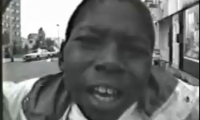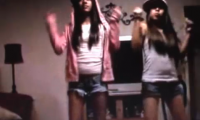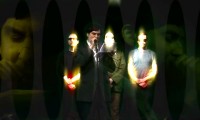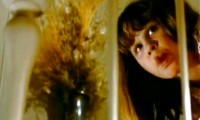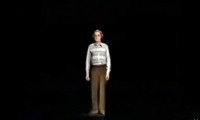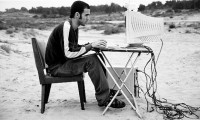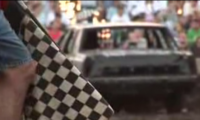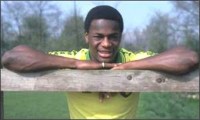Every few days, my friend Mat and I email each other links to old school hip-hop videos. The fun of it, I think, is tweaking a pal’s memory to some long-lost hit he might have otherwise forgotten: Geto Boys, Stetsasonic, Eric B. & Rakim — back and forth we go, always trying to one-up the previous track.
(For example, I shot Mat a link to “Watch Out Now.” His reply: “Amazing… though I still think “Lost in Thought” was the pinnacle of 90s Latino hip-hop.”)
The last video I sent Mat was more recent: Fatlip’s first solo effort after getting kicked out of The Pharcyde in 1997. Mat’s response echoed how I felt about the video (directed by Spike Jonze): “Great Fatlip track. I love the kid that steals his bike — you’re friggin’ killing me…”
At first, “What’s up Fatlip?” struck me as it had in 2000: ridiculous, pathetic, hilarious. Fatlip was a crazy motherfucker who may or may not have been bounced from his group for being a crackhead. And here he was, playing the chump: a clown getting squared by a toddler, drunk on Crown Royal in a diaper and trenchcoat, all raggedy-ass blow-out and K-Mart sweatpants.
But, man. Something hooked me. I watched it again. And again. And again — I couldn’t get enough. I started really listening to what Fatlip was saying — “See I been a loser just about all of my life… I make myself sick” — and was like, whoa, what? The whole thing quickly sank from uncomfortably funny to tragic. Behind that twinkly beat, what the fuck had I thought he was rapping about?
Fatlip, “What’s Up Fatlip?” (2000)
“Of course all life is a process of breaking down,” begins F. Scott Fitzgerald’s “The Crack Up.” The essay, published in three installments of Esquire between February and April, 1936, was self-analysis made public, the author’s emotional and creative bankruptcy on full display.
In a response typical to his contemporaries, William Dubois dismissed the piece as “indulging… in sentimental wallows.” Fitzgerald’s revelations consciously resisted — even rejected—the macho posturing of male writers of the time. “The Crack Up” was too vulnerable, too personal, too honest — nothing anyone wanted to hear.
Hip-hop culture is just as intensely masculine, just as invested in illusions of bravado, as the literary scene of the first half of the 20th century. With some obvious notable exceptions, rappers can build careers on what are often fabricated gangsta images. But Fatlip’s not hard, and he’s too honest a guy to fake it. On “Writers’ Block,” off his only full-length solo record, 2005’s The Loneliest Punk, he raps:
I never been shot or been to jail.
But I’m beginning to wish I had been,
just to put it down on a pad with a pen.
How does someone who’s “far from hard” and “regarded as a retard” fit into a culture so rooted in machismo? It’s something that seems to have taken its toll on hip-hop’s great sad-sack MC. And so we get the intensely confessional “What’s up Fatlip?” — a rapper’s take on “The Crack Up,” the opposite of all the embarrassing cock-swinging and misguided ego-tripping we’ve come to associate, for better or worse (and some of this stuff is admittedly awesome), with hip-hop.
I won’t walk you through the video with my “insights”; if you’re feeling me at all you can watch it and come up with your own ideas. I do, though, want to speak briefly about what I think is the video’s most revelatory and redemptive moment — what Roland Barthes (yeah, I went there) might call the video’s punctum.
About two minutes in, Fatlip goes to visit his mother. A few jump-cuts later, he’s perched on the armrest of the living room sofa with her at his side. His mom seems to be humouring him to some extent, patiently and sort of vacantly looking into the camera (but her toe’s tapping — you can’t fade this beat!)
Fatlip’s flowing, caught up, and obliviously drops the line, “choppin’ bliggy on a table.” Immediately he realizes what he’s done — after a quick “oh shit” laugh, he looks, with the sort of wide-eyed severity that speaks of a lifetime’s worth of apologies, at his mom. But she’s laughing too. There’s love in her eyes; it’s okay.
In an interview a few years ago, Fatlip admitted, “I get broke to the point where I don’t even have enough to pay for a phone call to call my mother to borrow money.” But on “Today’s Your Day,” he raps, “My mission is this: get in position to assist my folks.”
He’s a torn-up dude, but articulating his struggles is Fatlip’s greatest strength. “What’s up Fatlip?” is less pity-dig than sublimating personal conflict and sadness into art; it’s honest and true because that’s all Fatlip can be.
The video ends in a typically therapeutic mix of self-mockery and humour, with Fatlip doing his best Anton Jackson impersonation (“I still got it, I been working on my stuff”) and dancing into the sunset — then, one last joke, a yipping Chihuahua chasing him down the street. It’s funny, and it’s okay to laugh. “What’s up Fatlip?” is a great track. I love the kid that steals his bike. And for a bunch of reasons, Fatlip friggin’ kills me.
– Pasha Malla
